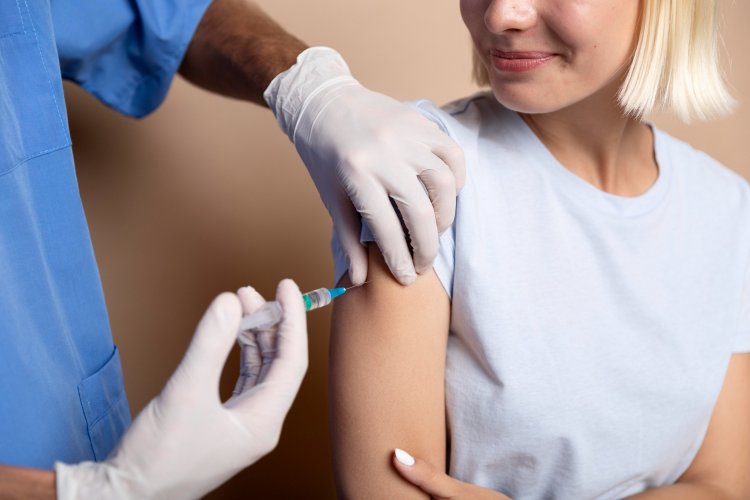Guardians Against Infection: The Power of HPV Vaccines
Human Papillomavirus (HPV): An Overview Human Papillomavirus (HPV) is a prevalent virus in humans, often causing no issues, yet in some individuals, it can lead to genital warts and even cancer. HPV primarily affects the skin and mucous membranes.

HPV Overview
HPV manifests in various types, affecting the mouth, throat, and genital area. Contrary to common belief, HPV transmission or symptoms don’t exclusively rely on sexual intercourse; it can spread through skin-to-skin contact in genital areas, anal, vaginal, or oral sex, as well as shared items like towels. Notably, HPV infection may not exhibit any symptoms, necessitating specific tests for detection.
While HPV infection may remain asymptomatic in many individuals, certain types can lead to significant health concerns such as genital warts, lichen planus, cervical cancer, anal cancer, penile cancer, vulvar cancer, vaginal cancer, and some head and neck cancers.
Diagnosis of HPV
HPV testing is typically part of cervical cancer screening, known as the HPV-Pap Smear Test, which can be conducted before symptoms of cervical cancer arise. This screening involves taking a small cell sample from the cervix and testing it for HPV. Screening is recommended for women aged 30 to 65 years every five years.
The primary goal of screening is to facilitate early detection of cervical cancer and reduce associated mortality and morbidity. Given the heightened risk of anal cancer among homosexual men, HPV testing is also recommended for men in this risk group.
Prevention and Vaccination
While complete protection against HPV is not achievable, two key recommendations can aid in HPV prevention:
-
Using condoms during sexual intercourse can reduce the risk of HPV transmission, though they do not offer absolute protection due to incomplete coverage of genital areas.
-
HPV vaccines provide protection against the most common HPV types causing genital warts and cervical cancer, although they do not cover all HPV types.
HPV Vaccination
HPV infection is the leading risk factor for cervical cancer. The most commonly used HPV vaccines are bivalent and quadrivalent vaccines. The bivalent vaccine offers protection against the most common HPV types, 16 and 18, which are associated with cancer.
The quadrivalent vaccine, in addition to HPV types 16 and 18, also protects against HPV types 6 and 11, which commonly cause genital warts. The quadrivalent vaccine, approved by the FDA, is administered to both boys and girls and can prevent a significant portion of cervical cancer cases when administered before exposure to the virus. Additionally, it provides protection against vaginal and vulvar cancers, genital warts, anal cancers, as well as certain head and neck cancers in both males and females.
HPV Vaccination Guidelines
CDC recommendations advise vaccination of boys and girls aged 11-12 years, with vaccination possible as early as age 9. This age range is selected considering that individuals are unlikely to have been exposed to the virus by this age. Vaccination response is better at a younger age.
There should be a minimum of six months between the first and second doses. While two doses of the vaccine provide protection against HPV up to the age of 15, individuals aged 15-26 require three doses for optimal protection.
FDA guidelines state that the quadrivalent vaccine can be administered between the ages of 9 and 45, although individuals aged 27-45 should consult a healthcare professional before vaccination.
Who Should Get HPV Vaccination?
HPV vaccination is suitable for both sexually active and non-sexually active individuals. It is particularly advisable for individuals who have not yet been exposed to HPV. Regular check-ups are recommended even after vaccination due to the various strains of the virus.
HPV can infect both males and females, with manifestations in the genital areas of women and men. Early vaccination provides maximum benefits.
Benefits of HPV Vaccination
The benefits of HPV vaccination extend to both males and females:
- Protection against cervical cancer, vaginal, vulvar, penile, and anal cancers caused by HPV.
- Prevention of genital warts.
- Protection against throat, mouth, head, and neck cancers caused by HPV.
- Induction of immunity against specific HPV types, aiding the body in combating future infections more effectively.
Frequently Asked Questions
Who Should Not Get the HPV Vaccine?
Pregnant women and individuals with severe illnesses should avoid the HPV vaccine. While HPV does not impede pregnancy, those seeking parenthood and encountering difficulties may explore options like in vitro fertilization (IVF) with their healthcare providers.
Individuals with severe allergies, including to yeast or latex, should consult a doctor before vaccination, especially if they've experienced severe allergic reactions to previous HPV vaccines.
Do Sexually Active Individuals Benefit from the HPV Vaccine?
Yes, they can benefit from vaccination. Even if an individual is infected with one type of HPV, vaccination can provide protection against other HPV types. However, no vaccine offers benefits against existing HPV infections; vaccines only protect against specific HPV types not previously encountered.
What Are the Side Effects of the HPV Vaccine?
Numerous studies have deemed the HPV vaccine safe, with reported side effects being mild. The most common side effects include pain, redness, and swelling at the injection site. Occasionally, individuals may experience dizziness or fainting after vaccination.
#HPV #CervicalCancer #Vaccination #Prevention #Health #SexualHealth #CancerPrevention #HPVVaccine #Screening #Healthcare #WomensHealth #MensHealth #Immunity #PublicHealth #FAQs #SideEffects #SafeVaccination #HPVTransmission #GenitalWarts #CancerAwareness
Disclaimer:
The information provided in this article is for educational purposes only and should not be considered medical advice. If you have any health concerns or are experiencing symptoms, it is important to consult with a healthcare professional, such as a doctor or clinic, for proper diagnosis and treatment. Always seek the advice of your doctor or other qualified health provider with any questions you may have regarding a medical condition. Do not disregard professional medical advice or delay in seeking it because of something you have read in this article.
What's Your Reaction?





















